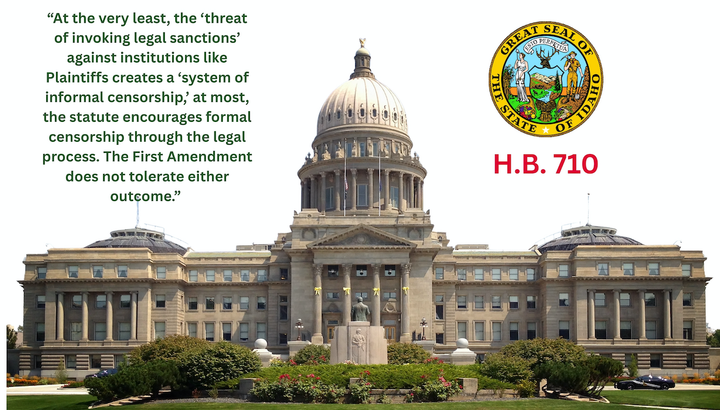States Move for Summary Judgment in IMLS Lawsuit
In an August 22 motion, a coalition of states are seeking to make Judge John J. McConnell’s May 6 preliminary injunction permanent. “There is no genuine issue as to any of the material facts," the filing states, adding that the Constitution "does not allow the President to shutter agencies himself.”

Attorneys for 21 states have filed a motion for summary judgment asking a federal judge in Rhode Island to permanently block the Trump Administration’s efforts to dismantle the IMLS and several other federal agencies targeted in a March 14 executive order.
“President Trump is leading a campaign to dismantle vast swaths of the federal government,” the plaintiffs’ August 22 filing states. “But whatever the President’s policy preferences, he cannot override the congressional enactments that authorize federal agencies, appropriate funds for them to administer, and define how they must operate.”
The motion—which is bolstered by a 300-plus page filing of undisputed facts—effectively reiterates arguments already successfully pleaded before judge John J. McConnell, who in May granted the states’ motion for a preliminary injunction and ordered IMLS employees back to work as well as the fulfillment of grants awarded to entities in the 21 plaintiff states.
In his unequivocal May 6 opinion, McConnell held that Trump’s attempts to “dismantle” the IMLS and several other “congressionally sanctioned agencies” likely violated the Administrative Procedures Act (APA) as well as running afoul of the Constitution by ignoring “the unshakable principles that Congress makes the law and appropriates funds, and the Executive implements the law Congress enacted and spends the funds Congress appropriated.”
Furthermore, in a June 5 decision denying the government’s bid to have the injunction stayed, McConnell forcefully doubled down on his findings, writing that his decision for the plaintiffs “was not a close call.”
The lawsuit, first filed on April 4 by 21 states, alleges that Trump’s controversial March 14 executive order, and the subsequent actions taken by administration officials to implement it, likely violate the Administrative Procedures Act and the Constitution.
An Unconstitutional Expansion
In moving for summary judgment, the plaintiff states now seek to make McConnell’s preliminary injunction permanent.
“There is no genuine issue as to any of the material facts, so summary judgment in favor of the Plaintiffs should be granted,” the motion argues. “If the President wants to cancel previously appropriated funds, he can request that Congress reconsider its funding decisions. But our Constitution does not allow the President to shutter agencies himself.”
Trump administration lawyers are also appealing the case before the First Circuit, seeking to overturn McConnell’s decision granting the injunction as well as seeking a stay of McConnell’s injunction while the case is litigated.
Notably, however, DOJ lawyers have thus far skirted the merits of the case, instead arguing only that the court lacks jurisdiction.
According to the DOJ, the fight over the administration's dismantling of the IMLS and other federal agencies is effectively a contract dispute, and DOJ lawyers insist that funding disputes must be litigated in the Court of Federal Claims under the Tucker Act, and that any “personnel claims,” including “terminations and reductions in force,” must first be litigated before other “Congressionally designated entities” under the Civil Service Reform Act (CSRA) before they can reach the federal courts.
In recent months, those arguments have gained some traction through a handful of Appeals Court and Supreme Court decisions that have paused lower court decisions blocking the administration’s efforts—including in a parallel case seeking to save the IMLS filed by the American Library Association in a Washington D.C. federal court.
In that case, federal judge Richard Leon initially had little trouble finding for the ALA in granting a temporary restraining order on May 1. But just two days later, on May 3, a divided appeals court panel overturned an injunction in Widakuswara v. Lake, a case in which a coalition of Voice of America journalists and grantees initially won their bid to block the Trump administration’s dismantling of the United States Agency for Global Media, which, like the IMLS, was also part of the administration's March 14 executive order. And in a subsequent June 9 decision, Leon reversed course and, citing Widakuswara and another case in which a sharply divided Supreme Court also issued a stay—Department of Education v. California—denied the ALA’s motion for a preliminary injunction, concluding that “the facts and the law” were “in flux” and that “the Tucker Act may indeed require that plaintiffs bring their case in the court of federal claims.”
Like the states’ case in Rhode Island, the ALA case is also now in the summary judgment phase. Lawyers for the ALA are set to file their motion for summary judgment on September 5, with the case scheduled to be fully briefed by November 7.
Unlike Leon, however, McConnell does not appear to be swayed by the DOJ’s arguments.
Among the findings in his May 6 decision to grant a preliminary injunction, McConnell held that the Supreme Court’s 5-4 ruling in California held little precedential value, noting that the decision, which came off the so-called “shadow docket,” was delivered based only on a “bare bones briefing, no argument, and scarce time for reflection.” Furthermore, the decision—as the Supreme Court itself stressed in its decision—was not based on the merits.
And for his part, McConnell forcefully rejected the DOJ’s arguments about standing and venue. The case is clearly not a contract dispute, nor is it a case about specific employee grievances, McConnell concluded, but rather questions whether the Trump administration “exceeded the bounds of their statutory or constitutional authorities.”
The larger question, meanwhile, is whether Congress will effectively moot the outcomes in these cases by legislatively eliminating the IMLS, as the Trump administration has once again proposed the permanent elimination of the IMLS.
In all four years of his first term Trump had proposed a federal budget that would permanently eliminate IMLS. But thanks to bipartisan support, library advocates were not only able to defeat the administration’s proposed shuttering of IMLS but actually won some $26 million in funding increases. This year's budget battle comes at a far more fraught moment politically, however, and the fate of federal library funding is very much in peril.


